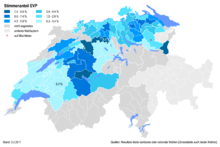Evangelical People's Party of Switzerland
Evangelical People's Party of Switzerland | |
|---|---|
 | |
| German name | Evangelische Volkspartei der Schweiz (EVP) |
| French name | Parti évangelique suisse (PEV) |
| Italian name | Partito Evangelico Svizzero (PEV) |
| Romansh name | Partida evangelica da la Svizra (PEV) |
| President | Marianne Streiff |
| Founded |
1919 P. Christian Protestant 1994 Swiss Evangelical P. |
| Headquarters |
Josefstrasse 32 Case Postale 3467 8021 Zurich |
| Membership (2011) | 4,600[1] |
| Ideology |
Christian democracy[2] Social conservatism[2] |
| Political position |
Right-wing (social) Centre-left (fiscal) |
| European affiliation | European Christian Political Movement |
| Colours | Yellow, black |
| National Council |
2 / 200 |
| Council of States |
0 / 46 |
| Cantonal legislatures |
39 / 2,609 |
| Website | |
|
www | |
|
Swiss Federal Council | |
The Evangelical People's Party of Switzerland (German: Evangelische Volkspartei der Schweiz, French: Parti évangelique suisse, Italian: Partito Evangelico Svizzero, Romansh: Partida evangelica da la Svizra) is a Protestant Christian-democratic political party in Switzerland, active mainly in the Cantons of Bern, Basel-Land, Basel-Stadt, Aargau and Zürich.[3] "Evangelical" translates as evangelisch, the German term for "Protestant", as opposed to "evangelical" as used in Anglo-Saxon Christianity.

The EVP is conservative on euthanasia, abortion, registered partnerships and other typically Christian issues, centrist on economic issues and stands rather centre-left on issues of wealth redistribution, education, environmentalism and immigration. Among other things, it claims to be "dedicated to protecting the environment out of a sense of responsibility for the Creation."
The EVP is a member of the European Christian Political Movement (EPCM) and was previously an observer member of the European People's Party (EPP) until 2008. In the Federal Assembly of Switzerland the EVP forms a joint group along with the Christian Democratic People's Party (CVP) and the Christian Social Party (CSP).[4]
References
- ↑ Der Bund kurz erklärt (in German). Swiss Confederation. 2015. p. 20.
- 1 2 Parties and Elections in Europe: The database about parliamentary elections and political parties in Europe, by Wolfram Nordsieck
- ↑ https://web.archive.org/web/20141103083828/http://www.parties-and-elections.eu/switzerland3.html. Archived from the original on November 3, 2014. Retrieved August 19, 2014. Missing or empty
|title=(help) - ↑ https://web.archive.org/web/20140429051157/http://www.parlament.ch/e/organe-mitglieder/bundesversammlung/fraktionen/fraktionen-49-legislatur/Pages/default.aspx. Archived from the original on April 29, 2014. Retrieved April 28, 2014. Missing or empty
|title=(help)
External links
- Official website (German) (French)